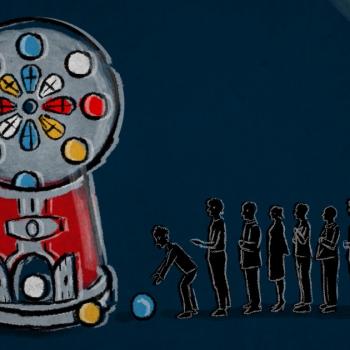Before you read this, I hope you’ll take a moment to read Part 1 in this series. The challenge of sexual frustration in NFP is a serious problem that deserves serious answers. Take a moment to read my original post that lays the groundwork for what follows. I’ll wait.
Read it? Great. Let’s continue.
Oh, in that last piece I said I’d deal with medical concerns and extended fertility etc in Part II. I see now that’s going to have to be Part III. That’s written already, but I’ll post it tomorrow. Thanks.
OK. Down to business. Let me start by sharing something about myself. (And I promise to get back to NFP in a minute. Hang in there with me please.)
I Hate Exercise.
I hate exercise. I mean I really, irrationally, HATE exercise. It makes me feel awful. I don’t enjoy it AT ALL.
Don’t get wrong. I like activities–dancing, chopping wood, hiking–but I don’t get too many opportunities to do those things. What I have the opportunity to do is push-ups and crunches and weight lifting and treadmills and cardio and all the things I ABSOLUTELY HATE with the burning passion of a 1000 suns.
Worst of all, these gym-type exercises tends to leave me haunted by the ghost of gym classes past, where I was repeatedly and mercilessly humiliated by my classmates and even teachers for not getting the rules for particular games, or not being able to keep up with the other kids in class, or being picked absolutely dead last for every game we ever played.
I recall the shame I would feel when my GPA would suffer, despite perfect grades in every other class, when I got a D in gym because I couldn’t climb as high on the rope or run or swim fast enough. Even more than not getting the point or the rules of most sports and dealing with the academic consequences of my phys ed failures, I had to put up with being honestly hated, teased, and shunned by the kids in my class for not having one iota of athletic skill or interest. Even now, when I exercise, I hear those kids voices making fun of me. It’s like reliving it over and over again. I feel ashamed. I feel defeated before I start. I carry a lot of emotional baggage around this issue.
But Greg, I LOVE Exercise!
I often hear people talk about how WONDERFUL exercise is. How much ENERGY it gives them. How GOOD it makes them feel. I can honestly say that I have never once had this experience in my life. Not once. I can’t even understand it. In fact, I really really want to hate these people. I know that’s wrong. But that’s what my default reaction would be. Fortunately, I can’t allow myself to go there.
You see, my oldest daughter, who is a dancer and competitive figure skater gets it. She LOVES exercise. Always has. Everything exercise is supposed to do for people, it does for her. She really is inspiring to me. I can admire her. I can be mystified by the things she can do with her body and her stamina and physical discipline, but I can’t really personally get where that kind of talent comes from. I don’t have it.
Getting Over Myself
Like I said, it would be easy for me to resent people who liked exercising. To think of them as narcissistic, body-worshiping jerks, or dumb jocks, or emotionally-crippled lunkheads who think with their muscles instead of the hearts or head. But that would be wrong because it is completely untrue.
People who like exercise–as my oldest daughter illustrates to me–are just wonderful people who have different talents than I have. In fact, I can learn a lot from them if I let myself. Because of my oldest daughter’s example and because of my own wish for continued good health as I get older, I have been working hard to overcome all the emotional and physical obstacles that stand between me and exercise. I am better for the struggle. I am learning to quiet–if not silence–those inner voices. I am learning to–dare I say it–kind of, sort-of, enjoy some kinds of exercising. I am finding that I am more coordinated than I thought I was, and stronger, and more physical in some ways. I am discovering things about myself I didn’t know were in me. I couldn’t learn those things about myself when kids and teachers were shaming me. Or when I was just keeping aloof and being resentful about what exercise did to me and how bad it made me feel. But in the loving environment of my family, where it is safe, I am learning to love this part of myself that I was taught to hate. Even though I have a long way to go, I am glad that I am finally learning.
What I DO Love…
As much as I hate exercise, I really do like sex. I love the intimacy of it. I love how it makes me feel. I find that it is wonderful on every level. I would love to make love all the time. But see, here’s the thing. That’s not real life. Sometimes you actually have to do other things. Even after you’re married. The house needs to be cleaned and things need to be done, and kids need to be raised and money needs to be made and sick spouses and children need to be cared for, and sometimes sleep actually does need to happen.
And herein lies the problem. If I love sex more than I love taking care of my wife, or my kids, or the gifts God has given me to exercise good stewardship over, then I have a problem. If my desire for sex makes me pouting, or angry, or irritable, then I have a problem. Namely, if I love sex so much that it makes me resentful toward my spouse that I can’t get it as often as I want, the way I want exactly when I want, then I love sex more than I love my wife–and vice versa for her. That makes sex something less than love. It means I am tempted to see my wife, and for her to see me, as a means to an end. It means that I am being tempted to see my marriage as the post upon which I can legitimately scratch my sexual itch and while that’s OK (even Augustine said so, claiming that marriage was a legitimate mechanism for dealing with sexual concupiscence) to SETTLE for that is to settle for less than God intended sex to be.
God Wants to Give You More.
God wants lovemaking to be more than scratching an itch. He wants it to be something that serves as a physical reminder of his love for me and my wife. It is meant to help us want to love each other better, not just in the bedroom, but across every dimension of our lives together. It is meant to help us see all the parts of ourselves and our relationship as a whole and not just think that we can treat each other, ourselves, and our relationship either poorly or with benign neglect–as long as we get to have sex.
Real Love = Real Work
But learning to love each other this way takes work. It is hard. Sometimes, we have to overcome those feelings of frustration. We have to overcome the fear that putting off sex tonight means never being loved the way we want to. We have to overcome the voices in our heads that say we aren’t lovable, or aren’t desirable, or a million other things that make us feel like not having sex right now is the absolute most horrible thing ever. I’m not making fun. I totally get this feeling. I have been there, but NFP has helped me work through all that and more.
NFP isn’t easy just like exercise isn’t easy. But even though NFP isn’t easy, just like exercise, it is good. It is a tool that develops my capacity to be the selflessly loving man that I want to be. That does not come easily to me. In fact, I would be hard pressed to say there is another tool that has forced me to grow as much as NFP has over the years. I am a better man–and my wife is a better woman–because of it. We don’t “enjoy” NFP any more than I can say that I enjoy exercise. But because we have been diligent about living it out, we see all the fruit that it has borne in our lives and relationship.
NFP does not have magical powers to make couples lovey-dovey marriage masters automatically. But it does force couples to do the work that they might otherwise never do if they didn’t make themselves learn to use the tool and use it well.
Understanding the Struggle
I understand people who struggle with finding the good in NFP. Honestly, on an emotional, superficial level, I find that there is little to like about NFP–just as I find that there is little to like about exercise. But in both cases, I understand that the fault in both cases really is me. And that isn’t a condemnation. That’s freedom. I know that my problem with exercise or NFP is my problem. The answer isn’t to try to convince the CDC and the AMA to condemn exercise because, dammit, it brings up so much baggage for me. The answer is for me to cooperate with God’s grace so that I can be delivered from all the shame and the pain and so that I can learn to really love this body he gave me–finally.
NFP, You Make Me Want to Be a Better Man
Similarly, yelling at the Church for making me do NFP because of all my sexual frustration totally misses the point. I mean, I GET it, but that still doesn’t mean it makes any sense. I need NFP exactly because of my capacity for letting sexual frustration block out everything else that’s good in my life and relationship. I may not love NFP, but I am grateful to it because it makes me work to be a better man–and my wife to be a better woman. I am grateful that we have been going through it together for 26 years and that the struggle has helped us celebrate an uncommonly deep, intimate and joyful love. Looking back, I am more and more convinced that our growth is not in spite of NFP but because of it. In the early years of our life together, I had to take the Church’s teaching on faith. It wasn’t easy. In fact, it would have been easy at many, many times over our 26 years together so far to chuck NFP altogether because it is hard. And it IS hard. But it also IS good.
All I can say is that no one in their right mind expects you to jump up and down with unabashed glee that you “get” to do NFP (Oh Goody!) any more than someone would look forward to exercising. Except that, weirdly enough, some people do naturally look forward to exercising. And the more you do it the more you begin to find that you can enjoy it yourself.
NFP Doesn’t Want You To Love IT.
Maybe we can never learn to love NFP. But maybe that’s not the point. Maybe, if we can embrace the cross that comes with it, we can learn the real point of NFP, which is that NFP doesn’t exist so we can love it for its own sake. Rather it exists so that we can learn to love our spouse for his or her own sake, and not for what we can get out of them.
If we can do that, then we can finally start to receive the gift that the Church is trying to give couples through NFP. A truly authentic, honest and real experience of love without use. To learn more about creating a genuine, joyful, passionate and sacred sexuality in your marriage, check out Holy Sex! The Catholic Guide To Toe-Curling, Mind-Blowing, Infallible Loving.













